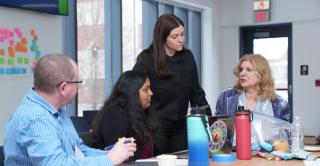
Vicarious trauma among student affairs practitioners was the focus of the Oct. 22 episode of the Student Affairs NOW podcast featuring Senior Equity & Inclusion Officer and Title IX Coordinator Dr. Jill Bassett-Cameron.
“Vicarious trauma is not a diagnosis, it's an experience of life,” Bassett-Cameron said.
The podcast, hosted by Raechele Pope, a professor at the University at Buffalo, and four other higher education professionals, serves to contribute to the field of student affairs and focus on “being restorative to the profession.”
This episode highlights the overlooked challenges of working in student affairs, a field involving emotions and emergencies. Pope noted that higher education has been slower to respond to vicarious trauma, even though it has long been recognized in medicine, social work, and law enforcement.
Bassett-Cameron said the side effects of vicarious trauma can include neurological, cognitive, emotional, spiritual, and physical symptoms, including anxiety, sleep disruption, disengagement, changes in eating habits, and difficulty listening. While self-care is effective, Pope and Bassett-Cameron emphasized that it must go beyond “yoga classes and scented candles.”
Bassett-Cameron describes vicarious trauma effects as a pendulum: at one end, there is the pleasure of helping others, and at the other, burnout.
“If you think about it, burnout is the worst of the worst; the opposite of that is called compassion satisfaction,” she said.
Unaddressed vicarious trauma is a costly issue, as it contributes to staff turnover and, in effect, “costs the institution, the business money.” Rather than accepting these struggles as an occupational hazard, she urged institutions to consider support for these professionals as a necessity.
Personal strategies she shared included structured venting — You vent three times… and then you move on” — incorporating water-based reset rituals like handwashing; and revisiting positive feedback.
Listen to the episode at https://studentaffairsnow.com/understanding-the-cost-of-caring-vicarious-trauma-in-student-affairs/.



